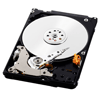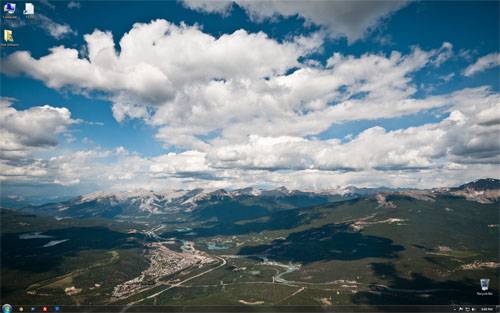- Qualcomm Launches Snapdragon 4 Gen 2 Mobile Platform
- AMD Launches Ryzen PRO 7000 Series Mobile & Desktop Platform
- Intel Launches Sleek Single-Slot Arc Pro A60 Workstation Graphics Card
- NVIDIA Announces Latest Ada Lovelace Additions: GeForce RTX 4060 Ti & RTX 4060
- Maxon Redshift With AMD Radeon GPU Rendering Support Now Available
Western Digital Scorpio Blue 1TB Mobile Hard Drive Review

Mobile warriors have their advantages, but storage isn’t one of them. It’s not uncommon to see desktop users with multiple TBs of hard drives, but notebook users tend to suffer with 500 or 750GB options. Western Digital, with its 9.5mm tall WD10JPVT, wants to change that – and trust us when we say that it’s well worth looking into.
Page 2 – Test System & Methodology
At Techgage, we strive to make sure our results are as accurate and real-world applicable as possible. We list most of the steps and processes involved in setting up and conducting our benchmarking process below, but in the interests of brevity we can’t mention every last detail.
If there is any pertinent information that we’ve inadvertently omitted or you have any thoughts, suggestions, or critiques, then please feel free to email us or post directly in our forums. This site exists for readers like you and we value your input.
The tables below list the hardware used in our current storage-testing desktop PC and notebook, which remain unchanged throughout our testing.
|
Component
|
Mobile HDD Test System – Desktop
|
| Processor |
Intel Core i7-980X Extreme Edition (3.33GHz Six-Core)
|
| Motherboard |
GIGABYTE X58A-UD5
|
| Memory |
12GB Kingston DDR3-1600
|
| Graphics |
NVIDIA GeForce GTX 580
|
| Audio |
ASUS Xonar Essence STX
|
| Storage |
Western Digital Scorpio Blue 1TB (WD10JPVT)
Western Digital Scorpio Blue 750GB (WD7500BPVT) Western Digital Scorpio Black 750GB (WD7500BPKT) |
| Power Supply |
Corsair HX1000
|
| Cooling |
Corsair H60 Liquid-Cooled
|
| Et cetera |
Windows 7 Ultimate SP1 64-bit
|
 Our Windows 7 Desktop for Mobile HDD Testing (Desktop PC; Wallpaper Credit) |
|
Component
|
Mobile HDD Test System – Notebook
|
| Model |
Gateway UC7807u
|
| Processor |
Intel Core 2 Duo T6400 2.0GHz
|
| Chipset |
Intel Cantiga GM45
|
| Graphics |
Intel 4500MHD
|
| Display |
13.3" Chi Mei N133I7-L01
|
| Memory |
3GB DDR2-667 5-5-5-15:
Samsung M4 70T5663QZ3-CE6 (2GB) Hynix HYMP112S64CP6-Y5 (1GB) |
| Hard Drive |
(Same as above.)
|
| ODD |
Optiarc AD-7640S Slot-Loader
|
| Audio |
Intel 82801IB (HDMI)
Realtek ALC663 |
| Network |
Intel WiFi Link 5100 AGN (a/g/n)
Realtek RTL8101E LAN |
Unlike the rest of the performance-testing we perform, using dedicated testbeds built around whatever product it is we’re benchmarking, most of our mobile HDD testing is performed on my personal PC. This isn’t something we’d usually do, but the same guidelines are adhered to.
The OS is tuned just as our benchmarking PCs are, and no unnecessary applications or services are run in the background during testing. The PC features specs that rid any chance of a bottleneck creeping in, and as with our other performance-testing, all tests are performed twice – or more if the first two runs differ to any important degree.
As part of our real-world testing, we both install Windows 7 to each drive and then test its cold boot performance. For this specific testing, we use the notebook platform listed in the table above. To assure that no bottlenecks existed there, we performed both tests using a Corsair F160 solid-state drive, which we also include the results for in our charts.
- General Guidelines
- The Core i7-980X Extreme Edition processor is turbo-locked for result consistency.
- No power-saving options are enabled in the motherboard’s BIOS.
- AHCI is enabled in the motherboard’s BIOS for best performance.
- Testing is performed using a SATA 3Gbit/s port tied to the X58 chipset.
- Windows 7 Optimizations
- User Account Control (UAC) is disabled.
- The OS is kept clean; no scrap files are left in between runs.
- Windows Update and OS power-saving settings are disabled.
- A full list of Windows services disabled can be seen here.
Our real-world testing consists of normal computer workloads, including Windows 7 installation and booting, file and folder transfers, music conversion, image manipulation and file archiving. For synthetic testing, we use a trio of proven industry benchmarks; Futuremark’s PCMark 7, Iometer 1.1.0 and HD Tune Pro 4.6.
As mentioned above, all tests are performed at least twice to assure accurate results. We’d like like to think we have such benchmarking down to a science, and methodically perform all tests the same way each time so that we can feel completely confident in our own results.
Support our efforts! With ad revenue at an all-time low for written websites, we're relying more than ever on reader support to help us continue putting so much effort into this type of content. You can support us by becoming a Patron, or by using our Amazon shopping affiliate links listed through our articles. Thanks for your support!





